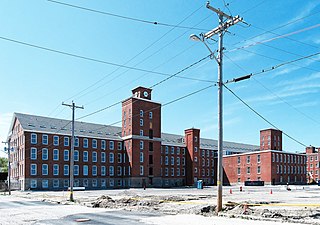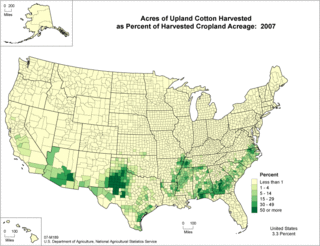
Richmond County is a county located on the central southern border of the U.S. state of North Carolina. Its county seat is Rockingham. The county was formed in 1779 from a portion of Anson County and named in honor of Charles Lennox, 3rd Duke of Richmond and Lennox. As of the 2020 census, the population was 42,946.

Fort Lawn is a town in Chester County, South Carolina. The population was 895 at the 2010 census.

Fort Mill, also known as Fort Mill Township, is a town in York County, South Carolina, United States. It is a suburb of Charlotte, North Carolina. As of the 2020 census, the population of the town was 24,521. Some businesses and residents in the Indian Land community of neighboring Lancaster County share a Fort Mill mailing address, but the official town boundary extends only within York County.

Southside, or Southside Virginia, has traditionally referred to the portion of the state south of the James River, the geographic feature from which the term derives its name. This was the first area to be developed in the colonial period.
The Lancaster and Chester Railroad or L&C is a railway headquartered in Lancaster, South Carolina. The original 29-mile (47 km) route connects Lancaster in Lancaster County with Chester in Chester County. The line's nickname is The Springmaid Line, which refers to its original purpose of connecting the plants of the Springs Mills company.

The Dominion Textile Inc. or Domtex was a Canadian textile manufacturer that was founded in 1905 and closed in 1998 when its remains were purchased by the American Polymer Group, at the time headed by Jerry Zucker.

The Charlotte Observer is an American newspaper serving Charlotte, North Carolina, and its metro area. The Observer was founded in 1886. As of 2020, it has the second-largest circulation of any newspaper in the Carolinas. It is owned by Chatham Asset Management.

Wamsutta Mills is a former textile manufacturing company and current brand for bedding and other household products. Founded by Thomas Bennett, Jr. on the banks of the Acushnet River in New Bedford, Massachusetts in 1846 and opened in 1848, Wamsutta Mills was named after Wamsutta, the son of a Native American chief who negotiated an early alliance with the English settlers of the Plymouth Colony. It was the first of many textile mills in New Bedford, and gradually led to cotton textile manufacturing overtaking whaling as the town's principal industry by the 1870s.
Collins & Aikman Corporation was an automotive manufacturer of cockpit modules and automotive floor and acoustic systems and a supplier of instrument panels, automotive fabric, plastic based trim and convertible top systems. The Company's operations spanned 15 countries, incorporating about 120 facilities and approximately 25,000 employees. It entered Chapter 11 bankruptcy on May 17, 2005 and went out of business on October 12, 2007.

Burlington Industries, formerly Burlington Mills, is a diversified American fabric maker based in Greensboro, North Carolina. Founded by J. Spencer Love in Burlington, North Carolina in 1923, the company has operations in the United States, Mexico, and India and a global manufacturing and product development network based in Hong Kong with over 8,000 employees on several sites in the United States, Canada and worldwide.

Cone Mills Corporation was an American textile manufacturing company. It produced cotton fabrics such as corduroy, flannel, and denim. The company headquartered in Greensboro, North Carolina.

Atherton Mill was a heritage streetcar station in Charlotte, North Carolina. The former at-grade side platform was located in front of the Trolley Barn at Atherton Mill and it had served as the southern terminus of the Charlotte Trolley, which connected South End to Uptown Charlotte.

The Hathaway Manufacturing Company was a producer of cotton textiles founded in New Bedford, Massachusetts in 1888 by Horatio Hathaway, a China trader and whaler in the Pacific.

The economy of South Carolina was ranked the 25th largest in the United States based on gross domestic product in 2022. Tourism, centered around Myrtle Beach, Charleston, and Hilton Head Island, is the state's largest industry. The state's other major economic sector is advanced manufacturing located primarily in the Upstate and the Lowcountry.

The Springs Mills Building is a 21-story office building at 104 West 40th Street in Manhattan, New York City, just west of Sixth Avenue and Bryant Park. The Modernist building sits on an L-shaped lot that extends back to 39th Street and rises to a thin glass hexagonal tower. An early example of the International Style in New York, the building was designed by the architectural firm Harrison & Abramovitz and built in 1961–1963. Its northern facade on 40th Street is designed to comply with the 1961 Zoning Resolution, enacted soon after the building's construction started, while its southern facade on 39th Street conforms to the older 1916 Zoning Resolution.

The United States exports more cotton than any other country, though it ranks third in total production, behind China and India. Almost all of the cotton fiber growth and production occurs in the Southern United States and the Western United States, dominated by Texas, California, Arizona, Mississippi, Arkansas, and Louisiana. More than 99 percent of the cotton grown in the US is of the Upland variety, with the rest being American Pima. Cotton production is a $21 billion-per-year industry in the United States, employing over 125,000 people in total, as against growth of forty billion pounds a year from 77 million acres of land covering more than eighty countries. The final estimate of U.S. cotton production in 2012 was 17.31 million bales, with the corresponding figures for China and India being 35 million and 26.5 million bales, respectively. Cotton supports the global textile mills market and the global apparel manufacturing market that produces garments for wide use, which were valued at USD 748 billion and 786 billion, respectively, in 2016. Furthermore, cotton supports a USD 3 trillion global fashion industry, which includes clothes with unique designs from reputed brands, with global clothing exports valued at USD 1.3 trillion in 2016.

The Avondale Mills were a system of textile mills located predominantly in Alabama, but also in Georgia and South Carolina, with headquarters in Birmingham, and later in Sylacauga, Alabama. The Birmingham neighborhood of Avondale was chosen to be the site of the first mill, hence the naming of the company. Founded in 1897, the mills employed thousands of Alabamians throughout its 109-year history until they closed in 2006. Avondale Mills was founded in 1897 by a consortium of investors including the Trainer family of Chester, Pennsylvania, the future governor of Alabama, Braxton Bragg Comer, and a group of Birmingham civic leaders including Frederick Mitchell Jackson Sr.

The 1928 New Bedford textile strike was a mass work stoppage of approximately 30,000 machinery operatives in several of the large cotton mills located in New Bedford, Massachusetts, USA. The strike, which ran for several months during the spring and summer of 1928, is remembered for the prominent role played by the Workers (Communist) Party of America in mobilizing the immigrant workers of the region.
Bibb Manufacturing Company was a textile company founded in Macon, Georgia, in 1876 and was sold to Dan River in 1998. Bibb Manufacturing Company, also known as "The Bibb Company" produced cotton products such as sheets, comforters, towels, curtains, and bedspreads. Bibb Manufacturing not only provided jobs for its employees but also medical care, schools, housing, and social workers to organize clubs, trips, and other events.

Unifi Manufacturing, Inc. is an American-based international textile manufacturing company which specializes in polyester yarns.















